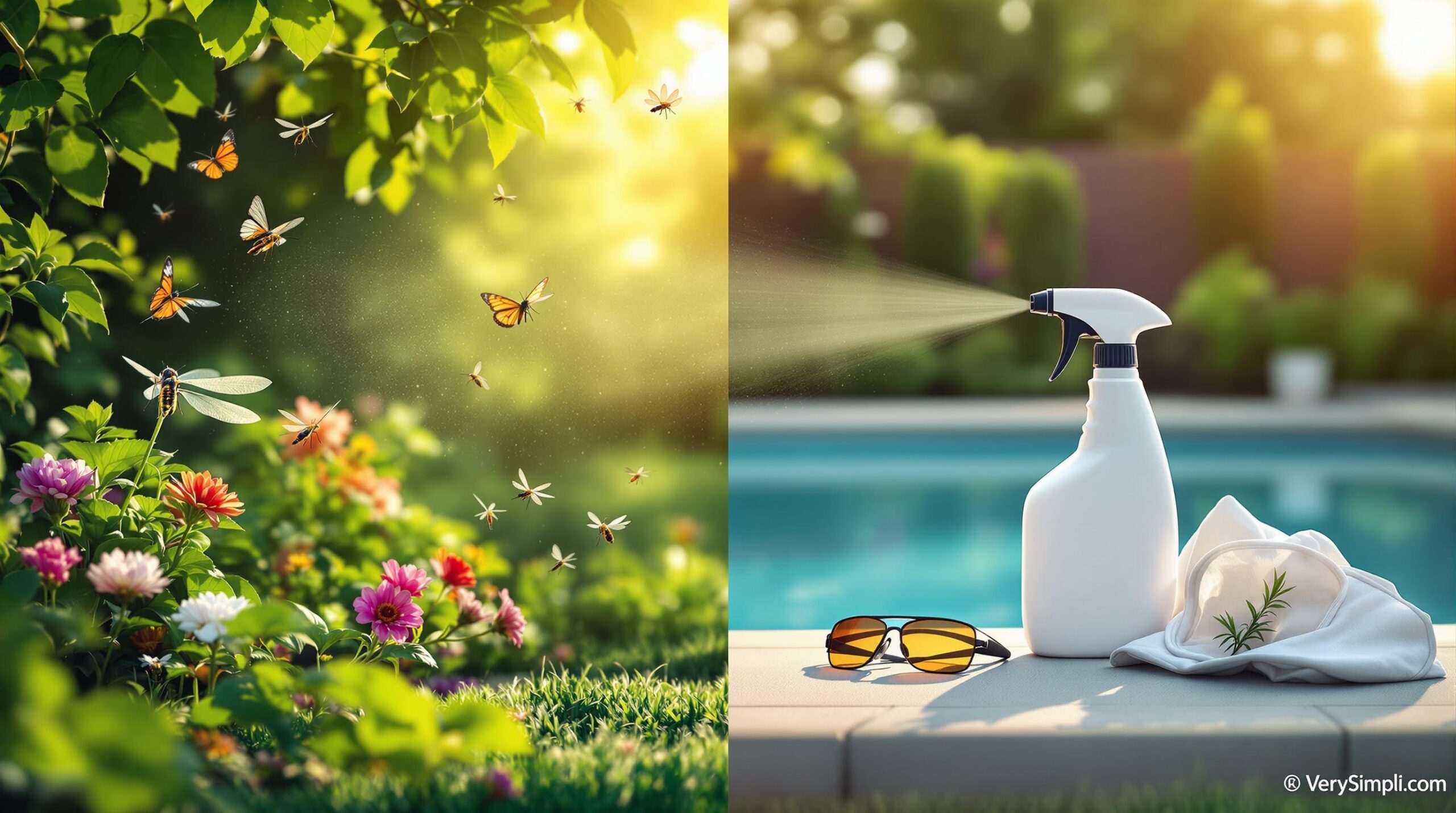Looking for the best way to keep mosquitoes away? Here’s the quick answer: chemical methods like DEET offer stronger, long-lasting protection, while natural methods like citronella or Bti are safer and eco-friendly but require frequent reapplication. The right choice depends on your priorities – effectiveness, safety, cost, or environmental impact.
Quick Overview:
- Natural Methods: Safer for families and pets, supports biodiversity, but works slower and needs frequent upkeep.
- Chemical Methods: Fast, long-lasting results, but can harm helpful insects and may pose health risks if overused.
- Best Strategy: Combine both – use natural methods daily and chemicals for severe infestations or high-risk times.
| Aspect | Natural Control | Chemical Control |
|---|---|---|
| Effectiveness | Slower, short-term results | Fast, long-lasting protection |
| Safety | Safe for pets and kids | May cause skin irritation |
| Environmental Impact | Eco-friendly, protects insects | Can harm non-target species |
| Cost | Low upfront, ongoing upkeep | Higher cost, less maintenance |
Start with prevention: eliminate standing water, use natural repellents like citronella, and reserve chemical solutions for heavy infestations. Read on to learn more about how to balance these methods effectively.
Mosquito Control Methods: Natural Repellents & Effective Insecticides
Natural Mosquito Control Options
If you’re looking for safer ways to manage mosquitoes, natural methods might be the way to go. These approaches rely on predators and plants to help keep mosquito populations in check.
Examples of Natural Solutions
Biological control introduces mosquito predators like birds, bats, and dragonflies into your yard. Setting up birdhouses or bat boxes can encourage these helpful animals to settle in and naturally reduce mosquito numbers [5].
Plant-based strategies are another option. Certain plants can repel mosquitoes effectively while enhancing your outdoor spaces. Here are a few popular choices:
| Plant Type | Benefits | Best Placement |
|---|---|---|
| Citronella Grass | Masks human scents that attract mosquitoes | Patio, garden edges |
| Lavender | Repels mosquitoes; visually appealing | Window boxes, garden beds |
| Marigolds | Deters mosquitoes; adds vibrant color | Throughout the garden |
| Basil | Repels insects; doubles as a kitchen herb | Seating areas, herb gardens |
Another powerful biological option is Bacillus thuringiensis israelensis (Bti), a natural bacteria that specifically targets mosquito larvae in standing water without harming other wildlife [5][6]. This makes it particularly effective for ponds or water features.
Advantages and Disadvantages of Natural Methods
Advantages:
- Safe for families, pets, and beneficial insects
- Promotes garden biodiversity and blends into landscaping
- Long-term cost savings with minimal upkeep
- Low impact on ecosystems
Disadvantages:
- Needs frequent reapplication compared to chemical products
- Shorter protection periods
- Varies in effectiveness depending on environmental factors
- Takes longer to achieve noticeable results
"Experts recommend combining natural methods with preventive measures like eliminating breeding grounds and using biological controls."
Natural methods focus on safety and long-term benefits, but if you’re after quicker results, chemical solutions might be worth considering next.
Chemical Mosquito Control Options
Chemical methods provide a quick and effective way to manage mosquito populations, especially when immediate results are needed. Unlike natural approaches, these methods prioritize rapid action over long-term environmental considerations.
Common Chemical Methods
There are several types of chemical mosquito control, each targeting a specific stage of the mosquito life cycle:
| Control Type | Active Ingredients | Target Stage |
|---|---|---|
| Personal Repellents | DEET, Picaridin | Adult mosquitoes |
| Barrier Sprays | Pyrethroids | Adult mosquitoes |
| Larvicides | Growth inhibitors | Larvae |
| Foggers | Organophosphates | Adult mosquitoes |
For standing water, larvicides like Bti are effective and minimize harm to helpful insects [6]. In areas where pyrethroids can’t be used, organophosphates offer another strong option under the right conditions.
Pros and Cons of Chemical Methods
Benefits:
- Delivers fast and long-lasting results
- Covers large areas and is widely available
Drawbacks:
- Can harm beneficial insects and lead to pesticide resistance
- Requires ongoing use, which increases costs over time
The success of chemical treatments depends on factors like proper timing (e.g., treating at dusk when mosquitoes are most active) and rotating different pesticides to prevent resistance [6][7]. While these methods are highly effective, balancing their immediate impact with potential environmental risks is crucial.
sbb-itb-5a38398
Comparing Natural and Chemical Mosquito Control
Effectiveness Comparison
Repellents containing DEET or picaridin are known for their strong performance, especially in areas where reliable protection is a must [1][3]. On the other hand, biological agents like Bti specifically target mosquito larvae, offering a focused and eco-conscious approach [5][6].
Safety and Environmental Considerations
Natural options are often seen as safer, particularly for families with kids or pets. Chemical repellents with DEET, however, can sometimes cause skin irritation if used for extended periods [1][3].
Environmental impact is another key factor. Chemical pesticides like pyrethroids and organophosphates can harm helpful insects and aquatic ecosystems [8][6]. Natural methods, by contrast, tend to work harmoniously with the environment by:
- Protecting biodiversity and beneficial insect populations
- Encouraging natural predators of mosquitoes
- Supporting long-term pest management strategies
"Mosquito control doesn’t have to rely on harsh chemicals. By embracing natural methods and preventive measures, you can effectively manage mosquito populations in your outdoor spaces, ensuring a healthier environment for you and your family." – Tomahawk Power [5]
Cost and Ease of Use
Using plants like citronella or lavender to deter mosquitoes is budget-friendly but requires regular upkeep [5][2]. Chemical treatments, while often pricier – especially for larger areas – deliver faster results and need less frequent application. These trade-offs underline the differences between the two approaches, which are summarized below.
Summary Table
| Aspect | Natural Control | Chemical Control |
|---|---|---|
| Duration of Protection | Short-lasting, needs frequent reapplication | Long-lasting, fewer applications needed |
| Environmental Impact | Supports ecosystems and beneficial insects | Can harm non-target species and water |
| Safety Profile | Safe for families and pets | May cause skin irritation, needs caution |
| Cost Structure | Lower upfront cost, ongoing upkeep | Higher initial cost, less maintenance |
| Implementation | DIY-friendly, slower results | Fast results, may require professionals |
The best choice depends on factors like where you live, how severe the mosquito problem is, and your environmental priorities. Many people find a mix of both methods works best – natural solutions for everyday use and chemical ones for bigger infestations or high-risk times.
Choosing the Right Mosquito Control Method
Factors to Consider
Selecting the best mosquito control method depends on factors like the size of your property, health considerations, and the severity of the mosquito problem. The Centers for Disease Control and Prevention (CDC) suggests evaluating local risks of mosquito-borne diseases before deciding [1].
Here’s a quick breakdown of key considerations:
| Factor | Ideal for Natural Control | Ideal for Chemical Control |
|---|---|---|
| Property Size | Small properties (under 1/4 acre) | Larger properties (1/2 acre or more) |
| Sensitivity & Impact | For those sensitive to chemicals or concerned about ecological effects | For those needing fast, effective results with minimal concern about chemical use |
| Mosquito Threat | Best for light to moderate infestations | Best for heavy infestations |
The Environmental Protection Agency (EPA) notes that while DEET-based repellents are highly effective, they might irritate sensitive skin [3]. Many homeowners find that combining both natural and chemical methods provides the most dependable results.
Combining Methods
A mix of prevention, natural deterrents, and selective chemical treatments often delivers the best results. Start with prevention – like eliminating standing water – then add natural solutions, and use chemicals only when dealing with serious infestations or during peak mosquito seasons. This approach balances effectiveness with reduced chemical exposure and less impact on the environment [2].
Natural methods should be used regularly for ongoing protection, while chemical treatments can be reserved for high mosquito activity or special occasions. Timing matters – natural solutions work gradually and require frequent application, while chemical options are better for quick, targeted control [1][3].
"Biological control agents like Bacillus thuringiensis israelensis (Bti) can effectively kill mosquito larvae without harming other wildlife, providing a safe and targeted approach to mosquito control" [5].
Conclusion: Balancing Effectiveness and Safety
Controlling mosquitoes effectively requires a mix of strategies – there’s no universal fix. The key is combining natural and chemical methods while keeping their downsides in check. This ensures a mosquito-free space without putting health or the environment at risk.
The EPA recognizes DEET as effective but notes potential health concerns [3]. On the other hand, natural options like Bti focus on mosquito larvae and help maintain ecological balance [5].
Here’s a simple guide to match strategies with protection levels:
| Protection Level | Recommended Strategy |
|---|---|
| Daily Prevention | Use natural repellents and physical barriers |
| Moderate Risk | Combine Bti treatments with other natural methods |
| High Risk Areas | Use EPA-approved chemicals alongside natural solutions |
Eco-conscious pest control is gaining traction, offering safer alternatives. Natural methods, such as citronella, are safer for long-term use but require frequent reapplication. Chemical solutions can be reserved for peak mosquito seasons or areas with higher risks.
"Biological control agents like Bacillus thuringiensis israelensis (Bti) can effectively kill mosquito larvae without harming other wildlife, providing a safe and targeted approach to mosquito control" [5].
Successful mosquito management involves regular monitoring and adjustments. Tailoring your strategy to your property’s needs and evaluating results ensures better outcomes. This balanced approach safeguards both your family and the environment.
FAQs
Are chemical mosquito repellents better than natural ones?
Chemical repellents like DEET and picaridin can protect you for 6-8 hours, making them a solid choice for high-risk areas or long outdoor activities. On the other hand, natural options, such as essential oils, typically last only 30-60 minutes, which suits brief outdoor exposure in low-risk areas. While chemical repellents offer longer protection, your choice might depend on factors like safety concerns, environmental considerations, and personal preferences. It’s all about striking the right balance between effectiveness and what works best for you.
Is citronella more effective than DEET?
Citronella can match DEET in effectiveness initially but evaporates quickly, meaning you’ll need to reapply it often. DEET, however, lasts much longer, making it more practical for extended outdoor use. Studies also point out that citronella, despite being natural, can sometimes cause skin irritation.
"Natural repellents are safer than others, so it cannot be assumed that ‘natural’ equals safe." – National Wildlife Federation, 2022 [4]
If you’re using citronella, here are some tips to get better results:
- Use diluted citronella oil to minimize skin irritation.
- Combine it with other natural methods to improve its effectiveness.






